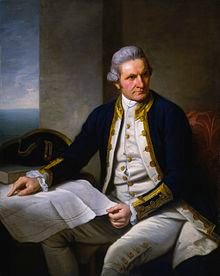
During the culture wars of the 1990s, two anthropologists had a contentious debate about whether Captain Cook was actually seen as a god or not by the native Hawaiian islanders. It all started when anthropologist Martin Sahlins thought he had solved the mystery of why the islanders would have killed him if they thought he was a god.” Sahlins’ solution to this mystery was that Cook’s original arrival on the island, due to the timing and a number of unintended coincidences, fitted precisely into the Hawaiian annual mythical cycle and resulted in him being identified by the islanders as an avatar of the Hawaiian god ‘Lono’. His departure from the island coincidentally also fitted within this mythical cycle and thus it passed without incident, what did not fit the cycle however was his return shortly after. Lono’s departure in the mythical cycle was supposed to signify the beginning of another god’s reign, which was ‘structurally required’ and so Cook/Lono’s return resulted in a ‘cosmological crisis’, which the Hawaiians eventually ‘solved’ via a ritual murder.”
Another prominent anthropologist named Obeyeskere accused Sahlins of uncritically accepting a European myth that Cook was a god. He “argued that the real reason behind Cook’s death was simply that he had been exploiting the Hawaiian people, had tried to kidnap one of their chiefs and was thus seen as a threat and duly dispatched. Obeysekere contended that the contemporary accounts that describe him being worshipped as a God were either inventions /later additions or were simply European’s misinterpretation of everyday Hawaiian customs.” Sahlins, he claimed, was guilty of ethnocentrism in imposing Western interpretations and myths on the story for which there were large gaps of evidence.
Obeyesekere claimed that one of the universal things that all people and cultures shared was a “practical rationality” which, he explained, “would have prevented the native Hawaiians from mistaking a British naval captain, who spoke no Hawaiian and did not look Hawaiian, as a Hawaiian.”
Now this criticism may sound pretty devastating, but Sahlins, who spent his career studying the drastically different ways other cultures interpret the world, returned with his own charge of anthropocentrism, claiming that Obeyesekere was assuming the islanders shared his own cultural framework and “replaced native thought with “the highest Western bourgeois values”, in order to express solidarity with indigenous peoples.”
To this day, the debate rages on between the two men and their supporters.
What do you think?
Once you’ve formed your opinion, let’s see what Drunk History has to say about it.